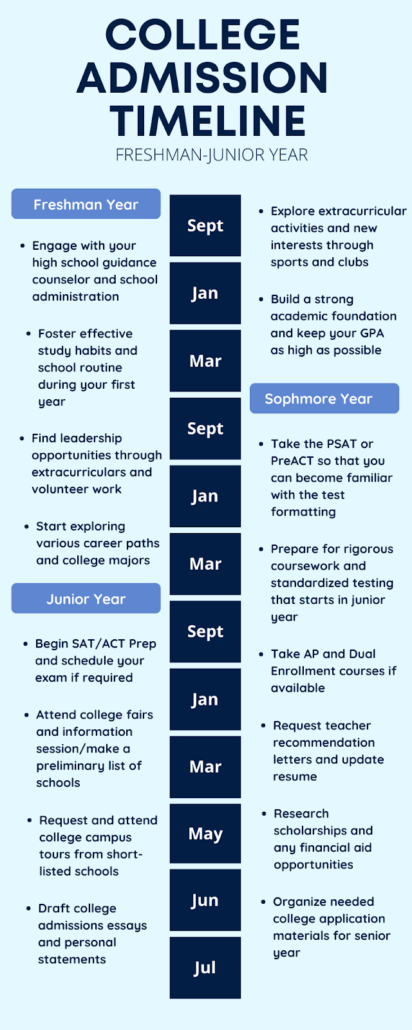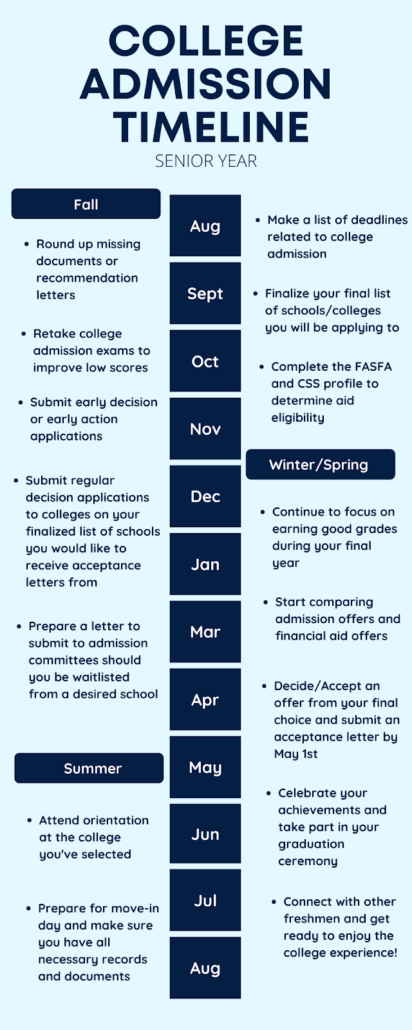
You’ve spent countless hours studying, participating in extracurricular activities, and dreaming about the perfect college experience. Finally, the time has come to transform those dreams into reality, but you’re feeling overwhelmed by the college admissions process.
Sound familiar? You’re not alone.
The good news is with a well-planned and strategic approach; you can tackle the admissions process head-on and increase your chances of landing a spot at your dream school.
This comprehensive guide will provide a step-by-step timeline for success, ensuring you stay organized and on track throughout high school.
By following our roadmap, you’ll be well-equipped to navigate the complexities of the college admissions maze and emerge with a triumphant outcome.
Laying the Foundation: Freshman and Sophomore Years
Freshmen Year
Adjusting to High School Life

As you begin your high school career, you must familiarize yourself with your school’s academic and testing requirements. Engage with your school counselor or guidance counselor to understand the expectations and resources available to help you succeed. This is also the time to establish a relationship with your school’s college counselor, who can guide you through the college planning process.
Fostering Effective Study Habits
Developing strong study habits early on is crucial for high school and college success. Start by setting aside dedicated study time, organizing your materials, and exploring various study techniques. The skills you develop during this time will lay the foundation for success in standardized tests and AP exams in the coming years.
Exploring Diverse Extracurricular Interests
Participating in extracurricular activities during your freshman year can help you discover your passions and demonstrate your commitment to college. Whether you’re interested in sports, music, clubs, or community service, participating in various activities allows you to develop leadership skills and make lasting connections with fellow students and mentors.
Building a Solid Academic Foundation

Your first year sets the stage for your academic performance throughout high school. Focus on maintaining a solid GPA and challenging yourself with rigorous coursework, as many colleges require strong academic records for admission. This foundation will be essential when you begin researching schools and determining their future requirements.
Sophomore Year
Honing Leadership Skills Through Extracurriculars
As you move into your sophomore year, continue developing your interests in extracurricular activities. Take on leadership roles, such as team captain, club president, or event organizer, to demonstrate your commitment and ability to colleges during the application process.
Delving Into Potential Career Paths
Your sophomore year is an excellent time to explore potential career paths and college majors. Attend college fairs and speak with current students or alums to gain insight into various fields of study. Utilize resources provided by your school counselor or guidance counselor to learn more about available opportunities.
Taking the PSAT as Practice
The PSAT is typically taken during your sophomore year and is a valuable practice opportunity for the SAT. The test also allows you to qualify for the National Merit Scholarship Program. In addition, familiarizing yourself with the format and content of the PSAT can help you identify areas for improvement and create a study plan for standardized tests in your junior and senior years.
Preparing for Challenging Coursework in Junior Year
Sophomore year is the time to prepare for the rigorous coursework and standardized tests that lie ahead in your junior and senior years. Work closely with your school counselor to choose appropriate courses, such as Advanced Placement (AP) or honors classes, that will challenge you academically and potentially earn college credit. Create a timeline for test dates and plan college visits to ensure you’re on track for a successful college application process.
Gearing Up for College: Junior Year
Fall Semester
Attending College Information Sessions and Fairs
Your junior year is the prime time to dive into the college planning process. Attend college information sessions and fairs to gather information about prospective schools, their application deadlines, and financial aid package options. These events provide an opportunity to meet college representatives, ask questions about the admissions process, and learn about the unique features of each school.
Formulating a Preliminary College List
Based on your research, create a preliminary college list with schools aligning with your academic interests, extracurricular pursuits, and financial needs. Consider factors such as location, size, and campus culture while narrowing down your choices. Consult your school counselor or guidance counselor for guidance on selecting colleges that suit your preferences and abilities.
Starting SAT/ACT Preparations

Begin preparing for the SAT or ACT during the fall semester of your junior year. Determine which test suits your strengths and register for test dates that give you enough time to study. You’ll also want to familiarize yourself with the test format, content, and strategies to improve your standardized test scores. Consider using resources like the College Board or test prep courses to help you prepare and plan a study session!
Engaging in Meaningful Community Service
Participate in community service projects that align with your interests and demonstrate your commitment to making a positive impact. In addition, meaningful community service can strengthen your college applications and showcase your dedication to causes that matter to you.
Spring Semester
Scheduling SAT/ACT exams
Schedule your SAT or ACT exams, remembering that you may want to take the test multiple times to achieve your desired score. Be aware of registration deadlines and test dates to ensure you have ample time to prepare and submit scores to colleges.
Participating in AP Courses and Exams
Enroll in Advanced Placement (AP) courses during your junior year to challenge yourself academically and potentially earn college credit. Prepare for AP exams, which are typically administered in May, to demonstrate your mastery of college-level material and boost your college application.
Requesting Teacher Recommendations
Identify teachers who know you well and can provide strong letters of recommendation for your college applications. Request letters early, giving your teachers ample time to write thoughtful, personalized recommendations highlighting your strengths and achievements.
Updating Your Personal Achievements and Resume
Maintain a record of your academic accomplishments, extracurricular activities, and any awards or honors you’ve received throughout high school. Then, update your resume with this information to make the college application process smoother and ensure you present a comprehensive picture of your achievements.
Making It Count: Summer Before Senior Year
Touring College Campuses
Take advantage of the summer break to visit local colleges and campuses on your list. College visits provide valuable insights into campus life, facilities, and the overall atmosphere. Schedule tours and information sessions to learn about each school’s unique features and help you make an informed decision.
Researching Scholarships and Financial Aid Opportunities
Explore scholarship opportunities and financial aid forms, such as the Free Application for Federal Student Aid (FAFSA) and the CSS Profile, to maximize your chances of receiving financial assistance. Be aware of scholarship deadlines and federal financial aid requirements to ensure you submit all necessary materials on time.
Drafting Personal Statements and Essays
Begin working on your personal statements and supplemental essays for your college applications. Reflect on your experiences, values, and goals to craft compelling essays that showcase your unique perspective and set you apart from other applicants.
Organizing College Application Materials
Create a system for organizing your college application materials, including transcripts, test scores, essays, and letters of recommendation. Stay on top of application deadlines and requirements for each school on your list to ensure you submit a complete and timely application.
The Home Stretch: Senior Year
Fall Semester
Finalizing Your College List
As you enter your senior year, review and refine your college list. Consider factors such as academic programs, campus culture, location, size, and financial aid packages. Consult with your school counselor or guidance counselor to ensure that your list includes a balanced mix of reach, target, and safety schools based on your academic and testing achievements.
Submitting Early Action/Early Decision Applications
If you have a clear top-choice college, consider applying through Early Action or Early Decision programs. Be aware of the early decision deadlines and requirements, as these applications are typically due in November. Remember that Early Decision is binding, while Early Action is not.
Completing the FAFSA and CSS Profile
Submit the Free Application for Federal Student Aid (FAFSA) and the CSS Profile to determine your eligibility for federal financial aid and institutional aid. Be mindful of financial aid deadlines, which may differ from college application deadlines.
Staying on Top of Deadlines

Create a calendar or timeline to track application deadlines, test dates, and scholarship opportunities. Ensure you submit all required materials, such as transcripts, test scores, essays, and letters of recommendation, on time to avoid jeopardizing your chances of admission.
Spring Semester
Managing Regular Decision Applications
Continue submitting Regular Decision applications, paying close attention to each school’s specific requirements and deadlines. Regular Decision applications are typically due between January and March.
Receiving and Comparing Admissions Decisions
As acceptance letters arrive, evaluate your options by comparing factors such as academic programs, campus life, and financial aid offers. Consider revisiting campuses, attending accepted student events, and connecting with current students to better understand each school’s environment.
Evaluating Financial Aid Offers
Review and compare the financial aid packages offered by each college. Consider factors such as grants, scholarships, work-study opportunities, and loans. Then, contact the financial aid office if you have questions or need to negotiate your aid package based on other offers.
Deciding on Your College Destination
After carefully considering all factors, make your final decision and commit to a college by National Decision Day, typically May 1st. Notify the other colleges of your decision, and thank everyone who has supported you throughout the college admissions process, including teachers, counselors, and mentors.
After the Acceptance Letter
Celebrating Your Achievements
Take a moment to revel in your accomplishments after receiving your acceptance letter. You’ve successfully navigated the college application process, and your hard work throughout high school has paid off. Share your success with your family, friends, and school counselors who have supported you along the way. It’s also an excellent opportunity to thank your teachers who provided recommendation letters and guidance.
Planning for Orientation and Move-in Day

Once you’ve committed to a college, it’s time to start planning for orientation and move-in day. Pay close attention to any information your chosen school sends, such as the college application timeline, orientation schedule, and housing information. Keep track of important deadlines, like when to submit your Student Aid Report or any required SAT Subject Tests scores.
Ensure you have all necessary documentation, such as transcripts, immunization records, and financial aid forms. Reach out to your school counselors or college admissions consultants if you need assistance or have questions about the process.
Embracing the College Experience
As you embark on your college journey, be prepared to embrace new experiences, challenges, and opportunities. Make the most of your senior year, and begin preparing for the transition to college life. Attend college events, engage with your peers, and explore academic and extracurricular opportunities that will shape your college experience.
Remember that your college years are a unique opportunity to grow, learn, and develop lifelong relationships. Stay open to new experiences and maximize the resources and support available to you, from your school counselors to college admissions consultants. The skills and connections you develop during your college years will set the stage for a successful and fulfilling future.
Conclusion
As you conclude your college admissions journey, take the time to reflect on the experiences, lessons, and growth that have shaped your path. From your early years in high school to the moment you receive your acceptance letter, the college application process is a significant milestone in your life. Acknowledge the challenges you’ve overcome, the support you’ve received from teachers, counselors, and family members, and the personal growth that has led you to this point.
Staying organized and proactive throughout the college admissions process is crucial for success. Whether it’s managing deadlines, preparing for standardized tests, or researching financial aid opportunities, maintaining a clear plan and staying on top of tasks can make a significant difference in your college admissions outcome. This experience also serves as an important lesson for your future endeavors, as the skills you’ve developed in organization, time management, and communication will prove valuable in college and beyond.
Frequently Asked Questions
To balance academics and extracurriculars, prioritize effective time management and organization. Create a schedule that allocates time for both school work and extracurricular activities. Be selective about your extracurriculars, focusing on those that align with your interests and goals. Finally, remember to communicate with your teachers, school counselors, and guidance counselors for support and advice on maintaining a healthy balance.
When creating a college list, consider factors such as academic programs, campus culture, location, size, financial aid packages, and the school’s reputation. Consult your school counselor or guidance counselor to ensure your list includes a balanced mix of reach, target, and safety schools based on your academic and testing achievements.
To make the most out of college visits, schedule campus tours, attend information sessions, and engage with current students and faculty members. Research the college beforehand, prepare a list of questions, and take notes during your visit. If possible, sit in on a class or stay overnight in a dormitory to better understand the campus environment and student life.
Interviews can play a significant role in the admissions process, as they provide an opportunity for the admissions committee to get to know you beyond your application. Although not all colleges require interviews, they can help demonstrate your interest in the school, showcase your personality, and provide additional context for your application.
The timeline for hearing back from colleges varies depending on the application process. You can typically expect to hear back between December and February for Early Action and Early Decision applications. For Regular Decision applications, most schools notify applicants between March and April.
The college admissions deadlines vary depending on the school and the application process. Early Action and Early Decision deadlines are usually in November, while Regular Decision deadlines typically fall between January and March. It’s important to check each college’s specific deadlines and requirements to ensure timely application submission.
To improve your chances of getting accepted into your top-choice college, focus on maintaining a solid academic record, participating in meaningful extracurricular activities, and showcasing your unique qualities through your personal statements and essays. Seek guidance from your school counselor, attend college fairs, and research the specific requirements of your desired college to tailor your application accordingly.
Standardized test scores, such as the SAT or ACT, can play a significant role in the college admissions process, as they provide a standardized measure of your academic abilities. However, the importance of test scores varies by school, and many colleges have adopted test-optional or test-flexible policies. Therefore, it’s essential to research the testing requirements of each college on your list and prepare accordingly to maximize your chances of admission.
Bryce Welker is an active speaker, blogger, and regular contributor to Forbes, Inc.com, and Business.com where he shares his knowledge to help others boost their careers. Bryce is the founder of more than 20 test prep websites that help students and professionals pass their certification exams.












